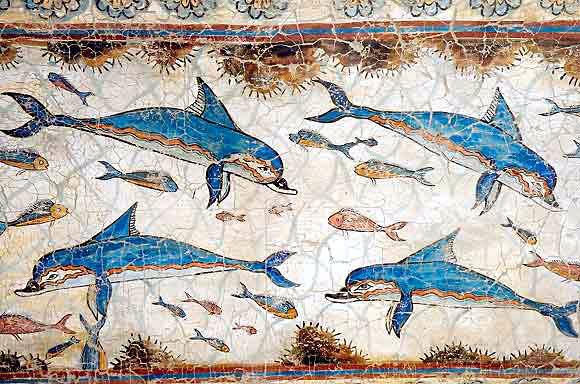But perhaps no deity provides a closer analogue to Slaanesh than Dionysius.
Dionysius is the god of the grape harvest, winemaking and wine, of ritual madness, fertility, theatre and religious ecstasy in Greek mythology. The modern day name Dennis comes from this word. He is also known as Bacchus is Roman mythology, and in this form his name is still synonymous with drunken revelry.
Dionysius is sometimes shown as a mature bearded male and sometimes as an androgynous youth. He holds a staff tipped with a pine cone known as a thysus. His procession his made up of wild female followers called maenads and hedonistic satyrs. Dionysus is represented as the protector of those who do not belong to conventional society and thus symbolizes everything which is chaotic, dangerous and unexpected, everything which escapes human reason and which can only be attributed to the unforeseeable action of the gods. The Dionysian Mysteries were a ritual in which worshippers which used intoxicants and other trance-inducing techniques to remove inhibitions and social constraints, liberating the individual to return to a natural state.
Dionysius delights in bursting into scenes of ordinary civilization (like the kool aid man) and overturning order in favor of chaos.
One of the Homeric hymns recounts how, while disguised as a mortal sitting beside the seashore, a few sailors spotted Dionysius, believing he was a prince. They attempted to kidnap him and sail him far away to sell for ransom or into slavery. They tried to bind him with ropes, but no type of rope could hold him. Dionysus turned the mast and oars into snakes, and filled the vessel with ivy and the sound of flutes so that the sailors went mad and, leaping into the sea, were turned into dolphins.
My first introduction to Dionysius was in Prince Caspian, a book in the Chronicles of Narnia by C.S. Lewis. In the story, the magical creatures of Narnia have been hiding or asleep for many years. The great lion, Aslan, calls the forest and river spirits awake and they swarm forth in an unruly horde led by Dionysius / Bacchus, dancing, singing, clashing cymbals and destroying signs of civilization. When they come to a restrictive girls' school they magically change the walls of the classroom into leafy branches and chase the teacher away with their wild, leafy ways.
I also remember with fondness the portly figure of Bacchus in Fantasia, where he leads the revelry of a band of classical mythical creatures to the music of Beethoven's Pastoral Symphony.
This innocuous figure may seem a far cry from Slaanesh of the Warhammer universe, but the elements of the archetype are present, even in this most child friendly of forms. The deity in Fantasia while harmless remains pleasure seeking, experiential, over imbibing, and lusty.
Invocation of Dionysus (from Orphic hymns)
- "I call upon loud-roaring and revelling Dionysus,
- primeval, double-natured, thrice-born, Bacchic lord,
- wild, ineffable, secretive, two-horned and two-shaped.
- Ivy-covered, bull-faced, warlike, howling, pure,
- You take raw flesh, you have feasts, wrapt in foliage, decked with grape clusters.
- Resourceful Eubouleus, immortal god sired by Zeus
- When he mated with Persephone in unspeakable union.
- Hearken to my voice, O blessed one,
- and with your fair-girdled nymphs breathe on me in a spirit of perfect agape".


No comments:
Post a Comment